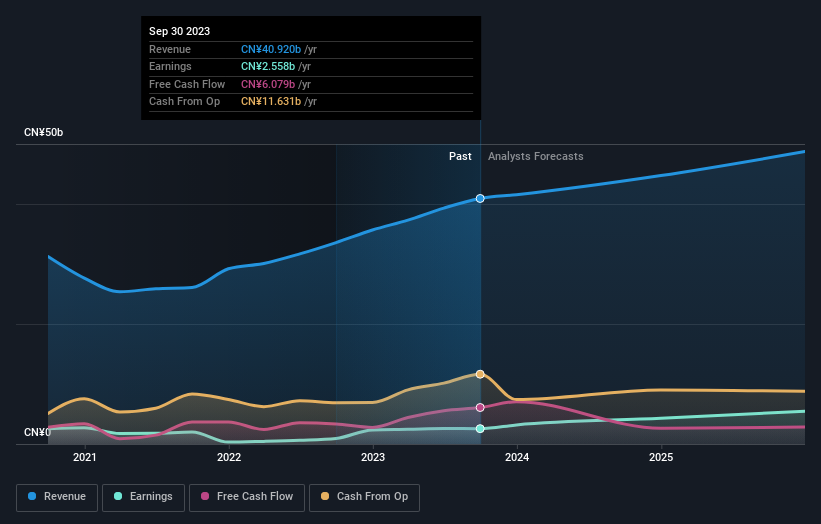- Hong Kong
- /
- Energy Services
- /
- SEHK:2883
China Oilfield Services Limited's (HKG:2883) stock price dropped 3.4% last week; private companies would not be happy

Key Insights
- China Oilfield Services' significant private companies ownership suggests that the key decisions are influenced by shareholders from the larger public
- 51% of the company is held by a single shareholder (China National Offshore Oil Corporation)
- Institutional ownership in China Oilfield Services is 25%
If you want to know who really controls China Oilfield Services Limited (HKG:2883), then you'll have to look at the makeup of its share registry. And the group that holds the biggest piece of the pie are private companies with 51% ownership. That is, the group stands to benefit the most if the stock rises (or lose the most if there is a downturn).
As a result, private companies as a group endured the highest losses last week after market cap fell by HK$1.3b.
In the chart below, we zoom in on the different ownership groups of China Oilfield Services.
Check out our latest analysis for China Oilfield Services

What Does The Institutional Ownership Tell Us About China Oilfield Services?
Institutional investors commonly compare their own returns to the returns of a commonly followed index. So they generally do consider buying larger companies that are included in the relevant benchmark index.
As you can see, institutional investors have a fair amount of stake in China Oilfield Services. This can indicate that the company has a certain degree of credibility in the investment community. However, it is best to be wary of relying on the supposed validation that comes with institutional investors. They too, get it wrong sometimes. If multiple institutions change their view on a stock at the same time, you could see the share price drop fast. It's therefore worth looking at China Oilfield Services' earnings history below. Of course, the future is what really matters.

We note that hedge funds don't have a meaningful investment in China Oilfield Services. Our data shows that China National Offshore Oil Corporation is the largest shareholder with 51% of shares outstanding. This essentially means that they have extensive influence, if not outright control, over the future of the corporation. In comparison, the second and third largest shareholders hold about 3.8% and 2.9% of the stock.
While studying institutional ownership for a company can add value to your research, it is also a good practice to research analyst recommendations to get a deeper understand of a stock's expected performance. There are plenty of analysts covering the stock, so it might be worth seeing what they are forecasting, too.
Insider Ownership Of China Oilfield Services
While the precise definition of an insider can be subjective, almost everyone considers board members to be insiders. Company management run the business, but the CEO will answer to the board, even if he or she is a member of it.
Insider ownership is positive when it signals leadership are thinking like the true owners of the company. However, high insider ownership can also give immense power to a small group within the company. This can be negative in some circumstances.
Our data cannot confirm that board members are holding shares personally. It is rare to see such a low level of personal ownership, amongst the board (and it is possible that our data might be incomplete). Concerned investors should check here to see if insiders have been selling or buying.
General Public Ownership
With a 25% ownership, the general public, mostly comprising of individual investors, have some degree of sway over China Oilfield Services. While this group can't necessarily call the shots, it can certainly have a real influence on how the company is run.
Private Company Ownership
Our data indicates that Private Companies hold 51%, of the company's shares. It might be worth looking deeper into this. If related parties, such as insiders, have an interest in one of these private companies, that should be disclosed in the annual report. Private companies may also have a strategic interest in the company.
Next Steps:
While it is well worth considering the different groups that own a company, there are other factors that are even more important.
Many find it useful to take an in depth look at how a company has performed in the past. You can access this detailed graph of past earnings, revenue and cash flow.
Ultimately the future is most important. You can access this free report on analyst forecasts for the company.
NB: Figures in this article are calculated using data from the last twelve months, which refer to the 12-month period ending on the last date of the month the financial statement is dated. This may not be consistent with full year annual report figures.
New: AI Stock Screener & Alerts
Our new AI Stock Screener scans the market every day to uncover opportunities.
• Dividend Powerhouses (3%+ Yield)
• Undervalued Small Caps with Insider Buying
• High growth Tech and AI Companies
Or build your own from over 50 metrics.
Have feedback on this article? Concerned about the content? Get in touch with us directly. Alternatively, email editorial-team (at) simplywallst.com.
This article by Simply Wall St is general in nature. We provide commentary based on historical data and analyst forecasts only using an unbiased methodology and our articles are not intended to be financial advice. It does not constitute a recommendation to buy or sell any stock, and does not take account of your objectives, or your financial situation. We aim to bring you long-term focused analysis driven by fundamental data. Note that our analysis may not factor in the latest price-sensitive company announcements or qualitative material. Simply Wall St has no position in any stocks mentioned.
About SEHK:2883
China Oilfield Services
Provides integrated oilfield services in China, Indonesia, Mexico, Norway, Rest of Middle East, and internationally.
Flawless balance sheet with solid track record.

